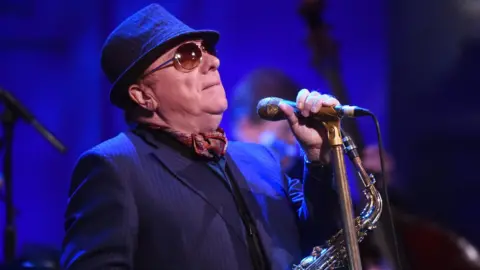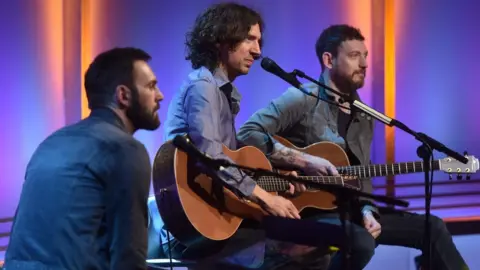Van Morrison, Snow Patrol and Ash in music industry aid plea
 BBC
BBCSir Van Morrison, Snow Patrol and Ash are among almost 150 artists urging "urgent financial support" for NI's music industry to survive.
They have written a letter to the Department for Communities (DfC).
The letter was addressed to the then minister, Deirdre Hargey, and said the coronavirus pandemic would have "serious implications" for the sector.
"As a result of Covid 19, the work of many in the music sector has come to an end overnight," it said.
The current Communities Minister Carál Ní Chuilín said she would be talking to organisations about funding.
Music venues have been closed since mid-March, and there has been no indication yet as to when when live performances can resume.
Although pubs in Northern Ireland open on 3 July the need for preventative health and safety measures are likely to mean that many will not host DJs or live music.
Music stars elsewhere in the UK have also warned that the music industry faces mass redundancies with gigs and festivals unlikely to return until 2021.
Soak, Neil Hannon, Bronagh Gallagher, David Holmes, members of Stiff Little Fingers and Two Door Cinema Club also signed the letter.
Snow Patrol singer Gary Lightbody said it could be next year before the live music industry is up and running again.
"There are no gigs and there will be no gigs in the foreseeable future," he said.
"An artist that needs gigs to live day to day, has one or two gigs every weekend and needs that money to pay the rent, to buy food, they just disappeared and to be honest they'll be gone for a while."
"There's so much other stuff that goes on in the background that people don't witness, there's so many freelance workers in music as well as the musicians, the struggling musicians themselves, that are feeling, not just the bite of this, it's swallowing people whole."
 JEFF OVERS/BBC
JEFF OVERS/BBC'We have never been more at risk'
The letter was sent to Ms Hargey in May, but has just been released to BBC News NI.
It said that while measures to guard against the spread of Covid-19 had been necessary, the cancellation of concerts, festivals, weddings and the closure of venues would be felt "by a vast majority of individuals who rely on music as their primary source of income".
"The outbreak is already having a far-reaching impact on both the personal income and quality of life of many in NI's music community," it said, "from individual freelancers and micro businesses to grassroots organisations, local music initiatives and established companies."
"We have never been more at risk.
"Music and the arts must be protected and we need urgent financial support to survive in any recognisable form."
John Reid, the Belfast-born president of the major concert organiser Live Nation Europe, also signed the letter to DfC.
Previous research by UK Music estimated that music tourism in Northern Ireland generated £90m in spending in 2018.
More than 1,000 full-time equivalent jobs were sustained by music tourism alone in Northern Ireland, according to UK Music.
But it also found that although a small proportion of musicians and songwriters earned exceptionally well, incomes for musicians in general were below the average wage in the UK.
Research published by the Northern Ireland Assembly on 29 May warned that many self-employed musicians were not eligible for income support schemes during the pandemic.
The Northern Ireland musicians' letter said that musicians, managers, producers and sound engineers had lost income and many venues were under threat of closure.
It asked Ms Hargey for "immediate help."
"Swift action must be taken to safeguard and invest in the future of an industry which has significant economic, cultural and social benefits for Northern Ireland," it concluded.
Funding announcement
The letter was written prior to the announcement of a £4m fund for the arts as a whole on 1 July by the current Communities Minister Carál Ní Chuilín.
"As an immediate next step I intend to engage directly with organisations to agree the detail of how the funds might best be put to swift use.
"This pandemic has exposed the financial vulnerability of our arts and cultural organisations, many of whom are household names," she said.
In evidence to Stormont's Communities committee in May, the Arts Council said nearly 7,500 people worked in the arts in Northern Ireland but that the pandemic had led to widespread losses of income for individuals and organisations.
